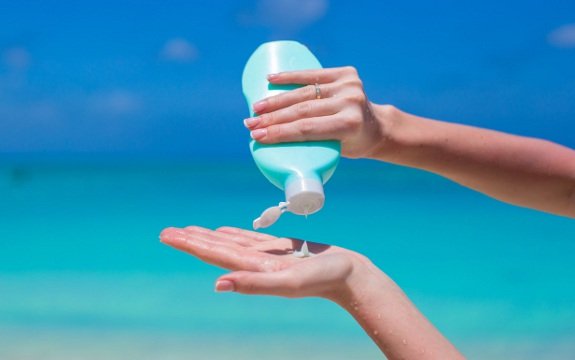Study: Sunscreen ‘Not Enough’ to Protect Against Skin Cancer

 Sunscreen has been slathered on by the truckloads in recent years, all because consumers are concerned about the potentially deadly rays from the sun. We’ve been assured that this lotion can protect us and everyone from doctors to journalists have promoted it as the most basic way of guarding against skin cancer. But a new study turns this advice on its head—suggesting sunscreen may not prevent some forms of skin cancer.
Sunscreen has been slathered on by the truckloads in recent years, all because consumers are concerned about the potentially deadly rays from the sun. We’ve been assured that this lotion can protect us and everyone from doctors to journalists have promoted it as the most basic way of guarding against skin cancer. But a new study turns this advice on its head—suggesting sunscreen may not prevent some forms of skin cancer.
According to the research published in the journal Nature, sunscreen can protect against sunburn, but can’t protect against the genetic damage from UV rays, damage that makes us more vulnerable to skin cancer.
For their work, researchers from Manchester University and London’s Institute of Cancer Research examined the effects of UV radiation on mice genetically altered to be susceptible to melanoma, the most deadly form of skin cancer.
While sunscreen with an SPF of 50 was found to delay tumor formation, it couldn’t stop the cancer altogether.
“Very importantly, this study provides proof that sunscreen does not offer complete protection from the damaging effects of UV light,” said lead researcher Richard Marais.
The sunscreen works to limit short-term and immediate effects of UV radiation. It prevents sunburn. But, enough UV “sneaks past” the sunscreen barrier to cause damage to DNA. Specifically, the radiation targets a gene called P53. Generally, P53 releases a protein to guard the genome from damage But the sun’s rays target this “guardian.”
In the mice studied, those who didn’t have sunscreen applied developed tumors within an average of 5.3 months of UV exposure. But after seven months, all of the mice had cancer.
“We never recommend that sun care products should be used to stay out in the sun longer, only as part of ‘sun safe’ behaviour, which includes staying out of the sun during the hottest part of the day, and covering up,” said Dr. Chris Flower of the Cosmetic, Toiletry and Perfumery Association of England.
Of course this study does not mean ‘don’t wear sunscreen’. In fact, you should wear sunscreen when out in the sun for extended periods of time. However, if you’re a regular reader of NaturalSociety, you’ll know that commercial sunscreens aren’t your safest bet – largely due to toxic chemicals used to make the sunscreen.
When paired with the potentially harmful chemicals found in conventional sunscreens, this study offers more motivation to seek out alternatives. For a list of safer conventional sunscreens and what to look for in your sunblock ingredients, click the link.
